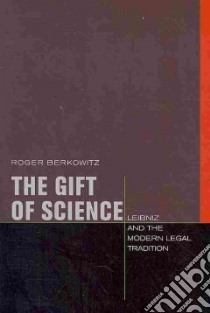The Gift of Science - 9780823231911
Un libro in lingua di Roger Berkowitz edito da Fordham Univ Pr, 2010
- € 37.20
- Il prezzo è variabile in funzione del cambio della valuta d’origine
The front pages of our newspapers and the chatter on the blogs bear witness to the divorce of law from justice. Highly paid lawyers mine the law for loopholes to help Fortune 500 corporations legally evade their taxes and spoil the environment. In a world governed by the rule of law, justice, it seems, is a chimera, an abstraction, and thus a distraction from the real world struggle over political interest. Ought we, then, to abandon talk about abstract ideals of justice in favor of strategic and political arguments? In The Gift of Science, a bold, revisionist account of 300 years of jurisprudence, Roger Berkowitz argues that the idea of justice is endangered and needs to be saved. Moving from the scientific revolution to the rise of law and economics, Berkowitz tells the story of how lawyers invented a science of law to preserve law's claim to moral authority. The giftof science to law, however, proved bittersweet. Instead of strengthening the bond between law and justice, the subordination of law to science transformed law from an ethical order into a tool for social and economic ends. The Gift of Science is a mesmerizing and original intellectual history of law. As a genealogy of the modern divorce of law from justice, Berkowitz shows that positive law has its formative impulse not in the English works of Thomas Hobbes and John Austin, but in the German tradition of legal science stretching from Gottfried Wilhelm Leibniz to Friedrich Carl von Savigny and Rudolf von Jhering. As a contribution to jurisprudence, Berkowitz argues that positive law is best understood as a product of science and not, as usually thought, as the will of a sovereign. As a work of political theory, Berkowitz explores how the subordination of law to social science has hollowed out the ethical center of law as the institutional embodiment of justice. Finally, the book makes manifest the danger that the transformation of law itself into a product of science poses for the possibility of law, justice, and freedom in the modern age.
Informazioni bibliografiche
- Titolo del Libro in lingua: The Gift of Science
- Sottotitolo: Leibniz and the Modern Legal Tradition
- Lingua: English
- Autore: Roger Berkowitz
- Editore: Fordham Univ Pr
- Collana: Fordham Univ Pr (Paperback)
- Data di Pubblicazione: 15 Marzo '10
- Genere: LAW
- Argomenti : Science and law History Jurisprudence History Law Philosophy
- Pagine: 214
- ISBN-10: 0823231917
- EAN-13: 9780823231911


